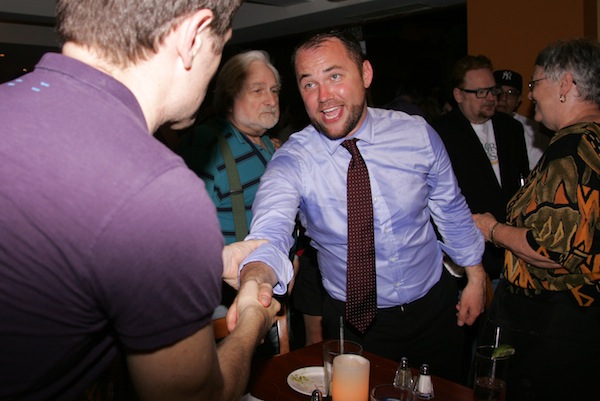
A jubilant Corey Johnson shook hands with supporters moments after declaring victory in the Council District 3 Democratic primary election.
By SAM SPOKONY | In a Sept. 10 primary election landslide, Corey Johnson, chairperson of Community Board 4, won the Democratic nomination for the City Council’s District 3. Since he will face no Republican opponent in the November general election, his victory effectively gives him the Council seat.
An openly gay man who has led C.B. 4 since 2011, Johnson took 63 percent of the vote, defeating civil rights attorney Yetta Kurland, an openly gay woman, who took 37 percent.
In a district that spans the West Village, Chelsea and Hell’s Kitchen, and includes around 180,000 residents, slightly more than 18,000 people turned out to vote on Tuesday. The support for Johnson was equally strong within each contested neighborhood, as Board of Elections data showed that he prevailed at virtually every District 3 polling site.
Johnson will take over the District 3 seat from Christine Quinn, who has held it for the past 14 years.
“I will fight for the people in this district. That’s my pledge,” said Johnson, after he declared victory in front of nearly 100 cheering supporters at Mustang Harry’s, a sports bar in Chelsea, at 352 Seventh Ave., two blocks south of Madison Square Garden. “We had great support from elected officials, but this was truly a grassroots, bottom-up campaign. It was all about the block association heads, the P.T.A. presidents, the tenant leaders and longtime residents.”
The primary winner later stressed, as he has throughout his campaign, that his first priorities upon taking the Council seat will be to focus on securing more affordable housing, improving local schools and fighting for a new area hospital to replace the former St. Vincent’s.
“There are definitely a lot of things to tackle,” Johnson said.
Once the polls had closed at 9 p.m., there was immediately a striking difference between the mood and scene at Johnson’s and Kurland’s post-election rallies — almost as if everyone already knew who had won. While Johnson’s party was packed with people like the tenant and community leaders he thanked in his speech, Kurland’s only drew about 20 people and was quiet from the start.
And as Johnson was declaring victory around 10:30 p.m., Kurland hadn’t even shown up to her own party yet.
A Kurland spokesperson did not respond to multiple requests for comment following the election, and the defeated candidate did not seem interested in conceding gracefully. In her concession speech later that night, Kurland reportedly called Johnson’s campaign a work of “evil genius.”
This is the second time Kurland has failed in an attempt to take the District 3 seat. She won 31 percent of the vote in a losing effort in 2009, when Quinn prevailed in a three-way race.
RJ Jordan, who served as Johnson’s campaign manager, said later on election night that he had felt victory coming throughout the day — even in the morning and afternoon, while the polls were still open.
“I made three loops around the district on my bike, saying thank you to people for coming out, and at every polling site, I saw all these great tenant leaders on our side,” Jordan said. “That’s when I felt it, and I thought, ‘Oh wow, we’ve really brought together a strong coalition of people in this community.’ ”
Assemblymember Richard Gottfried, whose district includes Chelsea, was also a big presence in the Election Day outreach for Johnson, who he had endorsed. The assemblymember spent the day alongside other campaign supporters, speaking to voters on Johnson’s behalf.
When asked why he put forth such a strong personal effort to support Johnson, Gottfried simply said, “Well, I don’t endorse a candidate halfheartedly, and Corey really has done terrific work in this community.”
The primary’s lopsided results notwithstanding, this was a tough, emotionally charged race that took its toll on both candidates.
The interactions between Johnson and Kurland became increasingly bitter toward the race’s end, culminating publicly in a raucous final debate on Aug. 26 (sponsored by NYC Community Media, the parent company of The Villager and East Villager). While both candidates traded barbs du8ring the campaign, Kurland was responsible for the vast majority of the attacks, especially at debates.
Along with lobbing personal insults and negative rumors, Kurland had repeatedly tried to portray Johnson as an untrustworthy real estate executive because of his previous work for GFI Development Corporation.
But voters didn’t buy it, and it seemed as though the persistent attacks — along with the fact that Kurland often spent more time assailing her opponent than presenting her own plans and credentials — only made Johnson a stronger candidate in the eyes of many community members.
After accepting his primary win, Johnson said he was quite happy to be done with talking about the past.
“I want to talk about the future, and about solving the problems this district faces,” he said, “and so I’m glad that the campaign is behind me.”
Another person who was understandably glad to see the negative campaigning end was Johnson’s mother, Ann Richardson.
Along with providing invaluable emotional support — “My mom is my best friend,” Johnson said to describe her — Richardson worked as hard as any staffer on the campaign, making thousands of phone calls to voters on behalf of her son, as well as driving down from Massachusetts to hit the streets with his supporters on Election Day.
“It’s very hard when people say negative things about your son, but I know him,” said Richardson, as she stood near the polling site at P.S. 33 in Chelsea. “He’s a passionate person, who just cares very much about this city and this district.”
There was a sense of symmetry in Richardson’s presence there during the primary.
When Corey Johnson first entered the public sphere in 2000, as a high schooler who dared to come out of the closet by telling his football teammates he was gay, readers and viewers of that story saw his mother alongside him every step of the way, exuding a composed, articulate expression of love and tolerance that struck a chord with millions of parents across the nation.
And when Johnson, 31, rose to declare victory Tuesday night, his mother was right there with him again. As her son spoke jubilantly to express gratitude to his supporters (including her), and to look forward to his role on the City Council, Richardson stood there quietly off to his right, beaming.
Toward the night’s end, after Johnson had given his speech and shaken hands with practically everyone in Mustang Harry’s, he stepped outside to get some air. One of his supporters, an older woman, was near the bar’s entrance and watched him as he stood there smiling, just taking it all in.
“Gee, I wish he was my son,” she said.
































